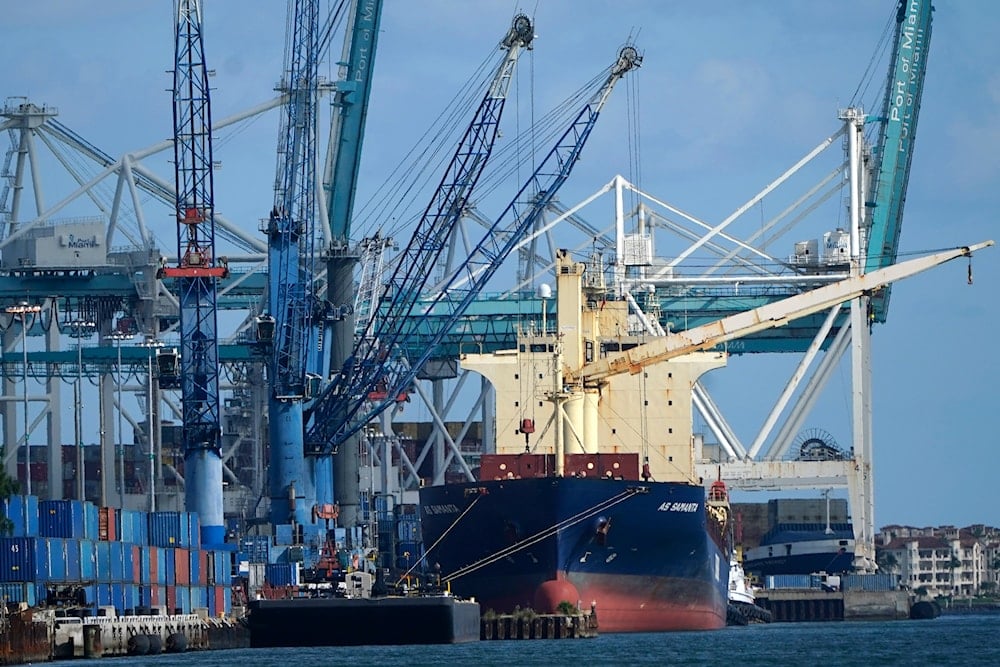Dockworkers at ports from Maine to Texas protest new shortages
Dockworkers at ports from Maine to Texas are protesting over wages and automation that risks reigniting inflation.
-

A container ship is docked at Port Miami, on October 19, 2021, in Miami. (AP)
Dockworkers from Maine to Texas began striking early Tuesday over wages and automation, risking inflation and goods shortages if the action continues for weeks.
The contract with about 45,000 members of the International Longshoremen’s Association expired at midnight, prompting the strike despite reported progress in negotiations. This is the first strike by the union since 1977, affecting 36 ports.
At the Port of Philadelphia, workers picketed shortly after midnight, chanting, “No work without a fair contract.” In Port Houston, over 50 workers gathered with similar signs, ready to begin picketing, citing unfair compensation from employers. The statement read, “The ILA is fighting for respect, appreciation and fairness in a world in which corporations are dead set on replacing hard-working people with automation,” adding, “Robots do not pay taxes and they do not spend money in their communities.”
The US Maritime Alliance, representing the ports, announced Monday evening that both sides had adjusted their wage offers. However, when picket lines formed just after midnight, it was clear no agreement had been reached.
The union initially sought a 77% pay raise over six years, with President Harold Daggett emphasizing the need to offset inflation and years of minimal increases. ILA members typically earn a base salary of around $81,000, with some making over $200,000 annually due to overtime. In response, the alliance raised its offer to 50% over six years and promised to maintain limits on automation from the previous contract. The union is advocating for a complete ban on automation, but the exact distance between the two sides remains unclear.
Strike's impact on imports
According to supply chain experts, consumers won't see an immediate impact from the strike because most retailers stocked up on goods, moving forward with holiday gift shipments. If the strike continues for more than a few weeks, it could severely disrupt the nation’s supply chain, leading to higher prices and delays in goods reaching households and businesses.
A prolonged work stoppage would force businesses to compensate shippers for delays and could result in late deliveries for the peak holiday shopping season, affecting everything from toys and artificial Christmas trees to cars, coffee, and fruit. The strike is expected to quickly affect supplies of perishable imports, such as bananas, with the affected ports handling 3.8 million metric tons annually—accounting for 75% of the nation’s supply, according to the American Farm Bureau Federation.
Additionally, it could disrupt exports from East Coast ports and create traffic congestion at West Coast ports, where a different union represents workers. Although railroads claim they can increase freight capacity from the West Coast, analysts believe they won’t be able to compensate for the cargo typically managed on the East Coast. “If the strikes go ahead, they will cause enormous delays across the supply chain, a ripple effect which will no doubt roll into 2025 and cause chaos across the industry,” noted Jay Dhokia, founder of supply chain management and logistics firm Pro3PL.
J.P. Morgan estimates that a strike shutting down East and Gulf Coast ports could cost the economy between $3.8 billion and $4.5 billion per day, with some losses potentially recovered once operations normalize. With the presidential election just weeks away, the strike could become a significant issue if shortages arise.
Retailers, auto parts suppliers, and produce importers had been hoping for a swift resolution or that President Biden would intervene using the Taft-Hartley Act, which would allow for an 80-day cooling-off period.

 4 Min Read
4 Min Read








